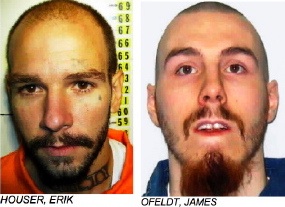There is light at the end of the tunnel for ESP inmate James “Big Time” Ofeldt and its 26 years away.
White Pine District Judge Stephen Dobrescu sentenced Ofeldt to two to ten years for the killing of cell mate Erik “Bingo” Houser and added that if Ofeldt got with the program he could see freedom in perhaps 26 years.
“You are a young man, 30 years old.” Dobrescu said. “You can still leave prison with a life ahead of you.”
Ofeldt escaped a possible death sentence earlier this year when a White Pine jury convicted him of the lessor charge of voluntary homicide.
According to Nevada law, involuntary manslaughter is the killing of a human being, without any intent to do so, in the commission of an unlawful act, or a lawful act which probably might produce such a consequence in an unlawful manner, but where the involuntary killing occurs in the commission of an unlawful act, which, in its consequences, naturally tends to destroy the life of a human being, or is committed in the prosecution of a felonious intent, the offense is murder.
A person convicted of the crime of voluntary manslaughter is guilty of a category B felony and shall be punished by imprisonment in the state prison for a minimum term of not less than 1 year and a maximum term of not more than 10 years, and may be further punished by a fine of not more than $10,000.
In addition to the charge he was convicted of Ofeldt was also charged with open or premeditated murder and second degree murder.
![]() The conviction of the least weighty of the charges can be taken as a victory albeit not a complete one for the ESP inmate.
The conviction of the least weighty of the charges can be taken as a victory albeit not a complete one for the ESP inmate.
Accused of the 2011 murder of his cell mate Erik “Bingo” Houser, Ofeldt has never denied the killing but instead has insisted he was acting in self defense.
Over the past two years, his defense attorney, Charles Odgers has laid at least a preliminary case of self defense and according to more than a few pieces of correspondence between prison officials and the White Pine County Sheriff’s office they may have enough to raise at least a reasonable doubt in the minds of jurors.
 Documents obtained by the Advocate at least suggest that both investigators from the prison and the White Pine County Sheriff’s Department did not dismiss that angle out of hand.
Documents obtained by the Advocate at least suggest that both investigators from the prison and the White Pine County Sheriff’s Department did not dismiss that angle out of hand.
According to those and other documents Ofeldt was fingered for killing to seal a truce between two white prison gangs the Aryan Warriors and the Skin Heads. Ofeldt, the correspondence suggested, was accused of being a snitch by the Aryan Warriors and Houser was picked for the job.
While the jury evidently did not completely buy that defense they bought enough of it for the man to avoid a death sentence.
The jury may have all taken Ofeldt mental state at the time of the killing.
 From the day he arrived in 2004 Ofeldt has apparently been at war with Ely State Prison waged against both staff and fellow inmates alike. According to his prison disciplinary report, Ofeldt has spent almost half his so far nine years in prison under one form of discipline or another and close to four years in solitary confinement otherwise know as disciplinary segregation.
From the day he arrived in 2004 Ofeldt has apparently been at war with Ely State Prison waged against both staff and fellow inmates alike. According to his prison disciplinary report, Ofeldt has spent almost half his so far nine years in prison under one form of discipline or another and close to four years in solitary confinement otherwise know as disciplinary segregation.
Most of the infractions Ofeldt was punished for were from fighting and assaults on other inmates to assaults on guards. His longest stretch in solitary began on October 31, 2009 and ended shortly before he killed cell mate Houser in May 2011.
The effect of solitary confinement on mental health has been studied and discussed by psychiatrists since the 1930s. According to psychiatrist Stuart Grassian, a specialist in the area, inmates are more likely to under-report than to over-report its effects (i.e., “Some of the guys can’t take it—not me”).
 Recently some have argued that evidence for a unique syndrome is insufficient and accused its proponents of bias because they advocate for prisoners in legal cases relating to solitary confinement. A study conducted by the Colorado Department of Corrections found that solitary confinement did not undermine mental health, and suggested that inmates in isolation often had mental health problems that should not be attributed to the isolation itself.
Recently some have argued that evidence for a unique syndrome is insufficient and accused its proponents of bias because they advocate for prisoners in legal cases relating to solitary confinement. A study conducted by the Colorado Department of Corrections found that solitary confinement did not undermine mental health, and suggested that inmates in isolation often had mental health problems that should not be attributed to the isolation itself.
The International Red Cross considers Solitary Confinement to be a form of psychological torture when the period of confinement is longer than a few weeks or is continued indefinitely. Negative psychological effects have been documented, leading one judge in a 2001 suit to rule that “[Solitary confinement] units are virtual incubators of psychoses—seeding illness in otherwise healthy inmates and exacerbating illness in those already suffering from mental infirmities.”
In juvenile detention, jail or prison since he was nine years old the inmate is if anything a poster child for all that is wrong with the prison system.



